Introduction
There are moments in life when destiny quietly knocks on your door, and you only realize its importance years later. For Faraz Qadir, that moment came in January, 2011 — the year Faraz Qadir’s musical journey took a turn that would shape not just his art, but his entire outlook on life. This blog shares the early days and struggles of Faraz Qadir, including his first meeting with the legendary Ustad Bade Fateh Ali Khan of the Patiala Gharana.
This is the story of how Faraz Qadir, a young dreamer with a love for music, became a disciple of one of the greatest masters of the Patiala Gharana in classical music — Ustad Bade Fateh Ali Khan — and how that bond transformed Faraz Qadir over a decade.
Meeting Ustad Bade Fateh Ali Khan
In 2011, Faraz Qadir’s father, already aware of Faraz’s growing interest in music, called him from office, Allama Iqbal Open University (AIOU) one afternoon.
“Faraz Beta, tayyar ho jao. Aaj shaam hum PNCA chal rahe hain.”
The Pakistan National Council of the Arts (PNCA), in F-5, Islamabad, is a place where creativity breathes — a hub for art, culture, and music. His father had found out that the legendary Ustad Bade Fateh Ali Khan, a pillar of the Patiala Gharana, conducted music training there twice a week.
When His father returned home, Faraz Qadir was already dressed — jeans, t-shirt, sneakers — ready for what he imagined would be a “modern” music class. His father took one look at him, smiled, and said:
“Faraz Bete, kapre badal lo. Hum aik adab wali jagah ja rahe hain.”
Confused, Faraz Qadir changed into a simple shalwar kameez.
Ustad Bade Fateh Ali Khan — The Maestro of the Patiala Gharana
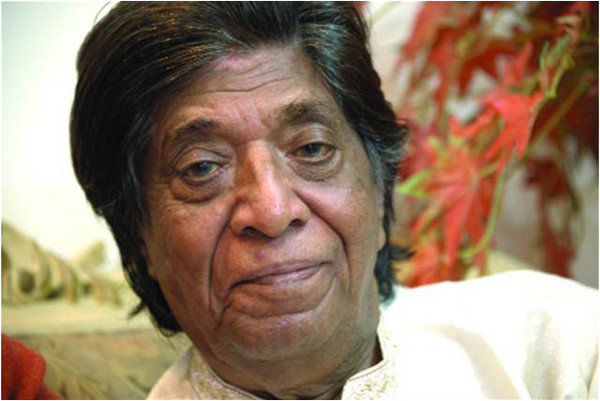
Ustad Sahab’s reputation reached far beyond Pakistan. His artistry had touched audiences worldwide, and his commitment to preserving the essence of classical music made him an icon. Yet, in person, he was humble and kind — always ready to share a lesson, correct a mistake, or inspire a student.
Ustad Bade Fateh Ali Khan’s voice flowed like an endless river: calm on the surface, but with a depth and flow that could carry you into another world. As a disciple of Ustad G, Faraz Qadir often found himself mesmerized, not only by what he sang but by how he carried himself as an artist and as a human being.
Faraz Qadir’s First Encounter With Ustad Bade Fateh Ali Khan
At PNCA, Faraz Qadir saw a standee: “Music Classes by Ustad Bade Fateh Ali Khan” and the classes were organized by Classical Music Heritage Trust. Faraz Qadir’s father respectfully introduced him to Ustad Bade Fateh Ali Khan as Ustad G came on the wheelchair which was controlled by Hassam Durrani (senior disciple of Ustad Bade Fateh Ali Khan). Faraz Qadir still remembers the words of his father, he said:
“Mere bache ko aapse seekhna hai Ustaad G.”
Faraz Qadir didn’t yet understand the weight of the name standing before him. His father left him there for the 3-hour class, saying he’d pick him up afterward.
Inside, there were only about 7–10 students. Faraz Qadir still remembers the moment when a group of 4 girls was singing a beautiful Tarana in Raag Bhairavi. At one point, Ustad G asked Faraz to sing as it’s a tradition whenever a newbie joins the music classes, he/she has to sing first. Faraz Qadir nervously sang:
“Pyaar nahi hai sur se jisko…” – A ghazal composed in Raag Malkauns
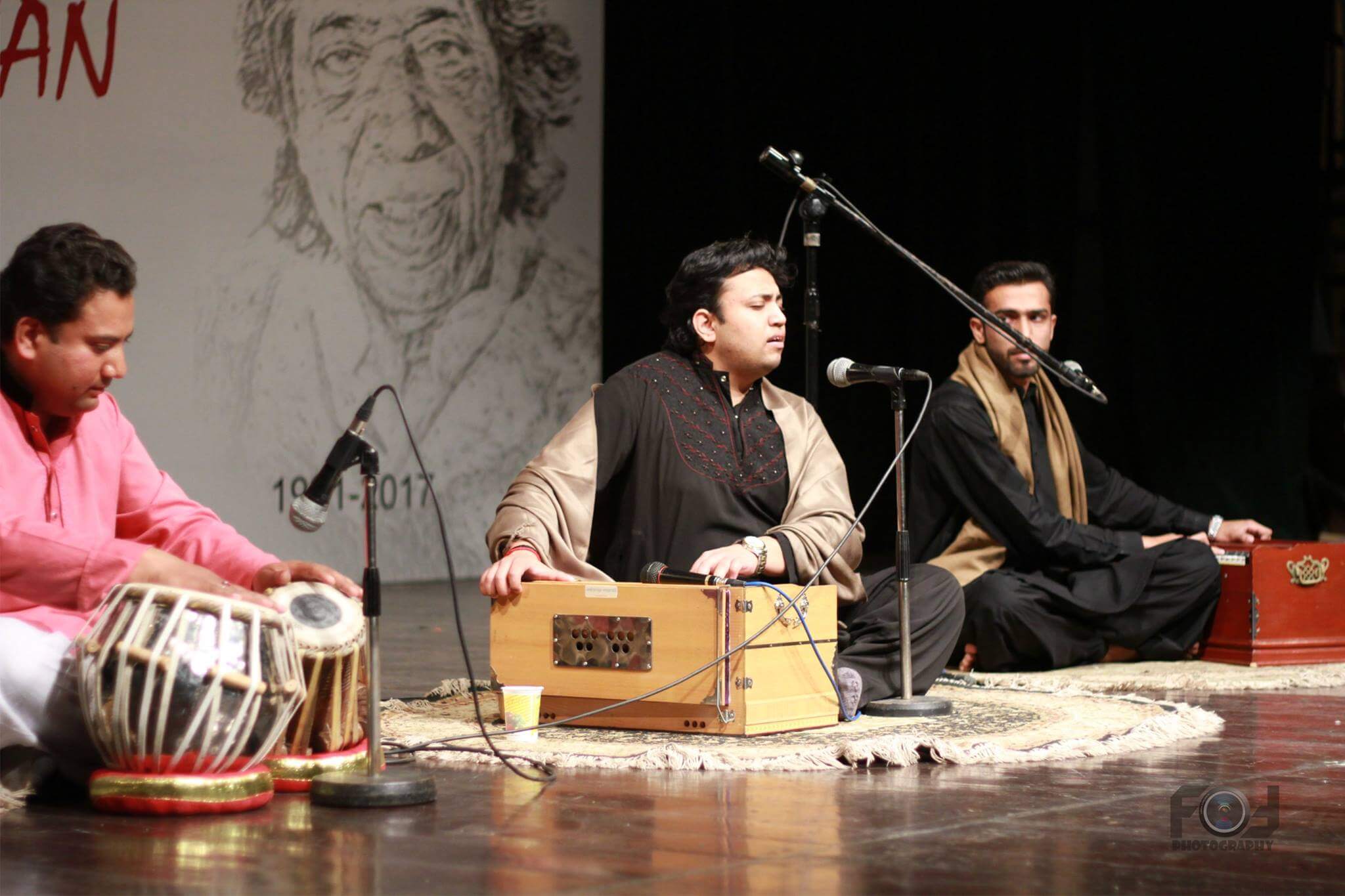
That song, unknown to Faraz at the time, was originally sung by Ustad G himself decades earlier with his elder brother, Ustad Amanat Ali Khan, and later re-recorded by his younger brother, Ustad Hamid Ali Khan which Faraz Qadir still remembers his father listening to on cassette while they travel in the car almost every time.
When Faraz Qadir finished, the room was silent. Ustad G didn’t comment — just smiled faintly and moved on. At the end of class, he said:
“Beta, is field mein sabse pehle izzat aur adab ko dekhna. Uske baad waqt do apne aap ko, riyaaz karo, aur jitna ilm le sakte ho mujhse lete raho. Tmko ilm lene ka tarika ana chaiye”
The Turning Point in Faraz Qadir’s Journey with Ustad Bade Fateh Ali Khan
The following week, Faraz Qadir was ready to quit. But when he walked into class, he froze. Sitting at Ustad G’s feet was none other than Atif Aslam — Faraz Qadir’s idol at the time (will write a blog on this story later) — seeking guidance and blessings from the same man Faraz Qadir was about to leave, Ustad Bade Fateh Ali Khan.
That moment changed everything for Faraz Qadir. That night, Faraz couldn’t find the words to express his feelings to anyone and finally he told his father:
“Abu, main inhi Ustad se seekhunga.”
As Faraz found the way for him, full of hurdles, but leading to success in the end!
Faraz Qadir’s Decade of Learning Classical Music from Ustad Bade Fateh Ali Khan – Patiala Gharana
From then on, Faraz Qadir wasn’t just a student — Faraz Qadir became like a son in Ustad G’s classes. For the first 3–4 months, Ustad Bade Fateh Ali Khan didn’t teach him directly. His role was to sit, listen, observe, and occasionally play the harmonium when allowed. It was a test of patience and commitment. At first, it was frustrating — not being allowed to sing in front of Ustad G or other students. But later, he realized this silent phase was the most beneficial foundation for his career and growth.
One day, Ustad G called Faraz and said:
“Beta, chalo ab seekhna shuru karte hain.”
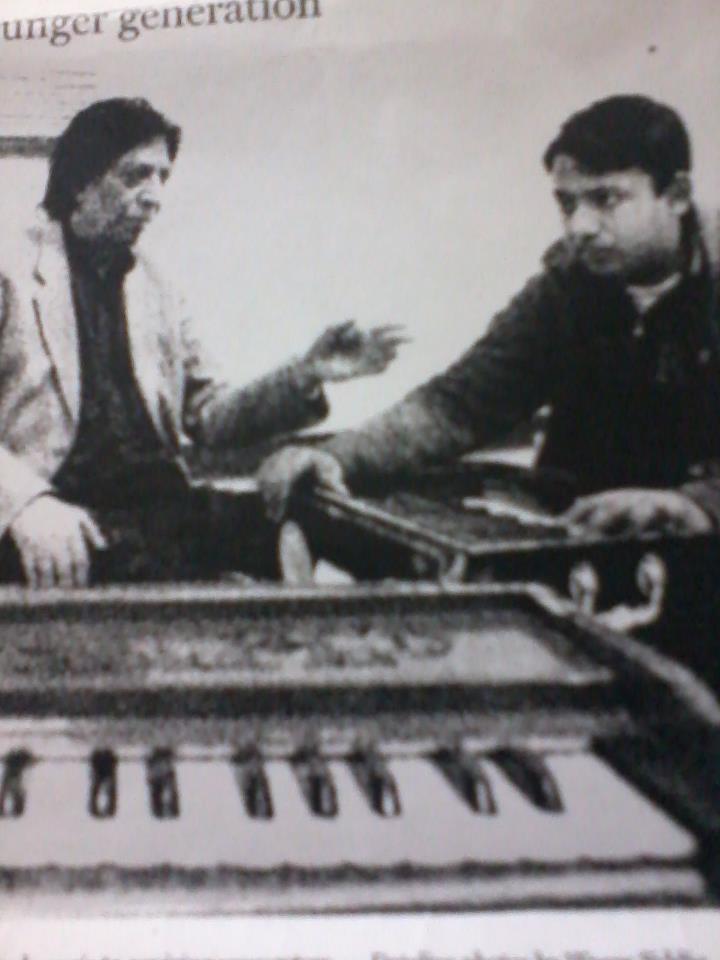
The first lesson was in Raag Bhopali — five notes, aroh, amroh, and a composition titled “Sun Re More Piyare Saajna”, created by Ustad G and his elder son, Ustad Sultan Fateh Ali Khan.
From there, Faraz Qadir’s days revolved around riyaaz — three to four hours daily — and weekly Sunday visits to Ustad G’s home. That’s where Faraz met great artists who came to seek blessings from Ustad G as respect. Slowly, Faraz Qadir began to understand the depth of the musical legacy he was now part of.
Ustad G’s family included legends like Shafqat Amanat Ali, Rustam Fateh Ali, Ustad Amanat Ali Khan (Insha Ji Utho, Ae Watan Piyare Watan), Ustad Hamid Ali Khan and many more. Faraz Qadir was learning from the root of an authentic, unmatched tradition.
It wasn’t just about notes and rhythms — it was about discipline, humility, and a way of life. Over ten years, Faraz Qadir learned that true mastery isn’t just talent — it’s patience, respect, and relentless dedication.
What This Bond Means to Faraz Qadir
Becoming Ustad Bade Fateh Ali Khan’s student wasn’t just an education in music — it was a transformation of Faraz Qadir’s entire being. Ustad Bade Fateh Ali Khan shaped not just Faraz Qadir’s voice, but his character.

Even today, every note Faraz Qadir sings carries Ustad G’s guidance, every performance holds his blessings, and every step Faraz takes in music honors the timeless tradition Ustad G entrusted to Faraz Qadir.
Why This Legacy Must Continue
In today’s fast-moving world, where trends change overnight, traditions like the Patiala Gharana risk being overshadowed, especially the golden knowledge of classical music delivered by Ustad Bade Fateh Ali Khan Sahab is also at risk of being lost.
But Faraz Qadir believes that classical music holds something timeless — a connection to our roots, a reminder of who we are.
Faraz Qadir’s mission now is to keep this legacy alive. Through teaching students across Pakistan, India, Saudi Arabia, and Australia, and through platforms like VCompose and FarazQadir.com, He aim to pass on what was given to him: not just music, but a way of life.
🎵 Key Lessons from Faraz Qadir’s Decade with Ustad Bade Fateh Ali Khan
- Respect and humility come before talent.
- Patience is the first raga every student must learn.
- Classical music is not just performance — it’s a way of life.
A Call From the Heart
If you’ve ever felt the pull of music — the kind that speaks to the soul — join Faraz Qadir in keeping this golden tradition alive. Explore His classes, attend a performance, or simply share this story to keep the Ustad Bade Fateh Ali Khan Sahab’s legacy alive. Because to preserve this golden knowledge, we have to take some actions.
The journey with Ustad Bade Fateh Ali Khan of the Patiala Gharana is not just Faraz Qadir’s story; it’s a story that belongs to all who cherish the beauty of classical music.
And as long as Faraz Qadir’s voice carries a note, it will carry Ustad Bade Fateh Ali Khan’s lessons, blessings, and the timeless art of the Patiala Gharana — the very tradition he entrusted to Faraz Qadir.

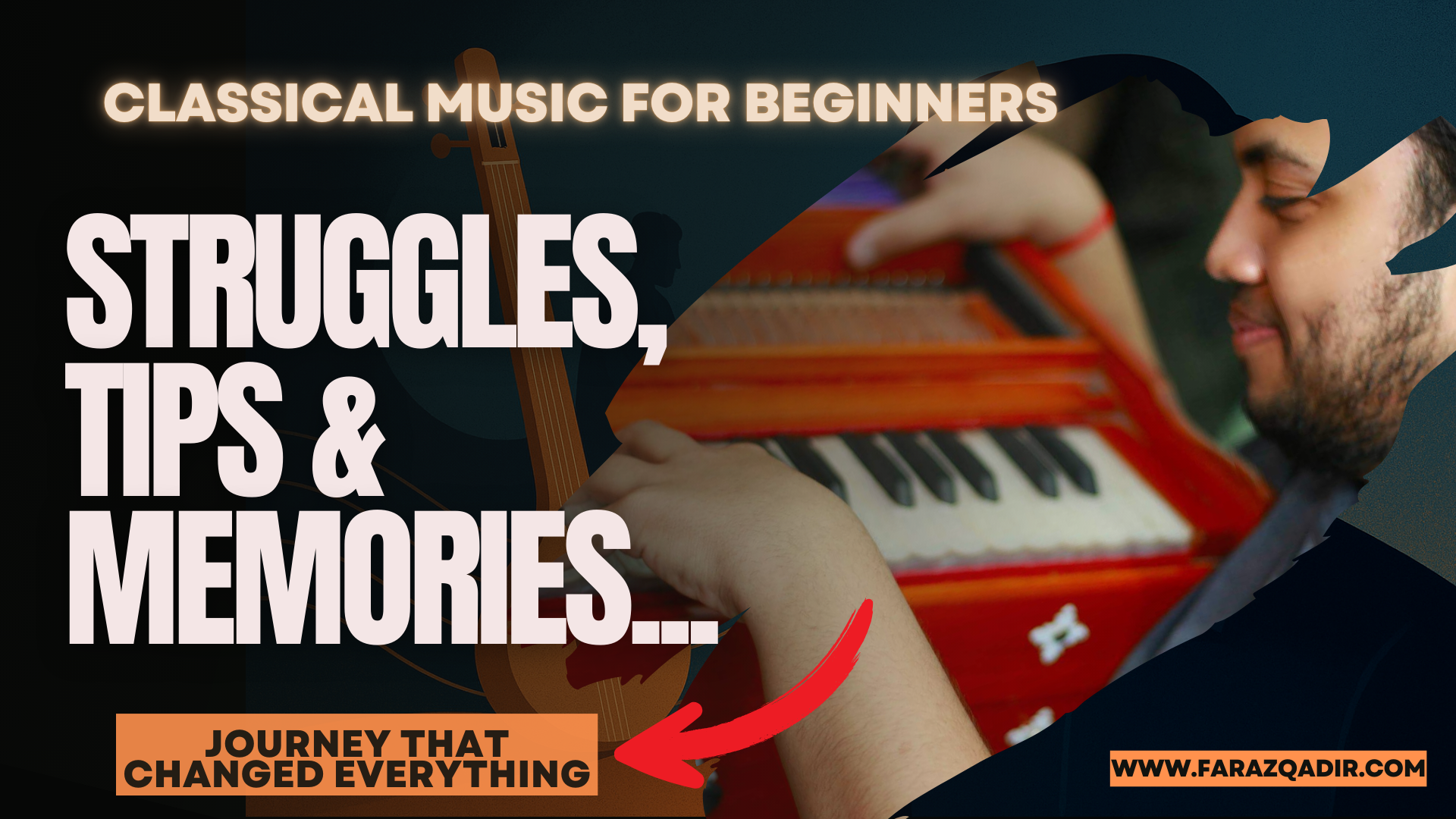
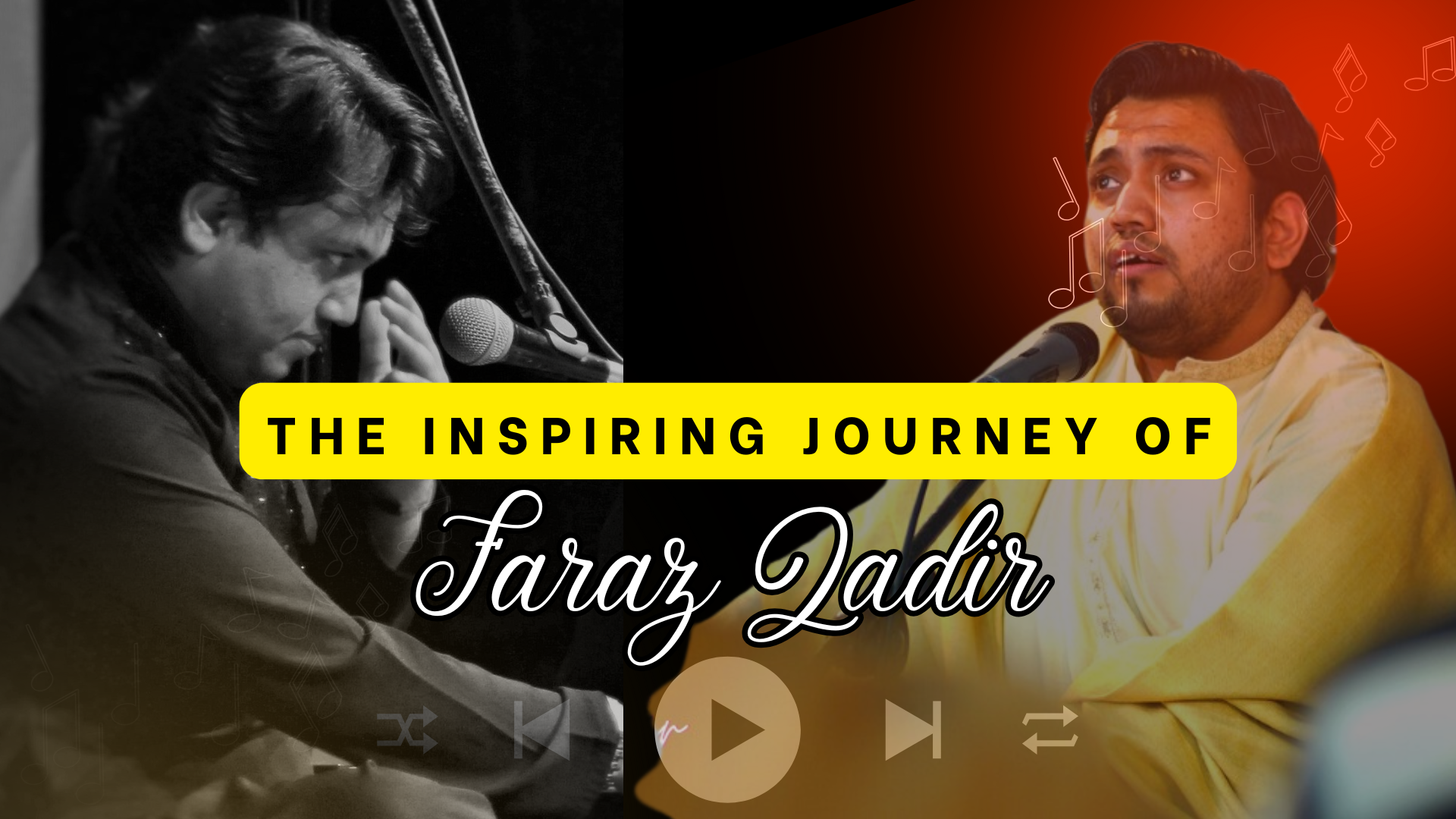
Leave a Reply